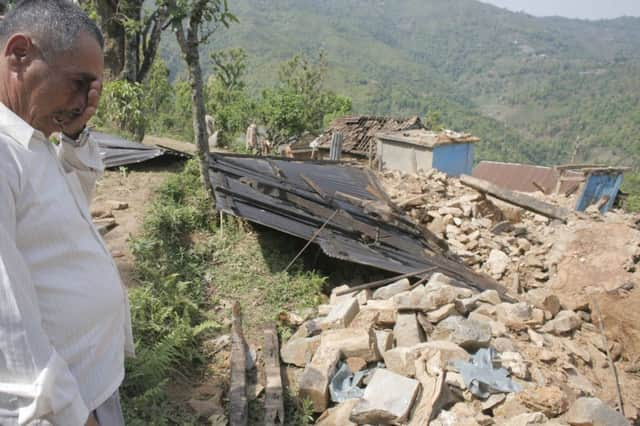Nepal earthquake victims still need support


As if the devastating earthquakes in Nepal weren’t enough, heavy monsoon rains are heaping further misery upon the survivors. Millions of people, already homeless, hungry and grieving the loss of their loved ones, are living under temporary shelters with little protection from the seasonal rains and cold.
Having lived in Nepal, and worked in many disasters such as the Boxing Day tsunami, Haiti earthquake and Philippines typhoon, the current situation and speed of the recovery process is both frustrating and predictable.
Advertisement
Hide AdAdvertisement
Hide AdWhen big disasters like this happen people are always very generous. Bound by solidarity and compassion, they want to do everything they can to save lives and help the survivors as quickly as possible. However, with the colossal damage to homes, businesses and vital infrastructure such as roads and communications, there’s never a quick fix. That’s why it’s vital that aid charities like SCIAF continue to help the survivors for the long term. Recovery takes years, not weeks or months –long after the media spotlight has moved elsewhere.
In Nepal, more than eight million people have been affected by the earthquakes, with over 365,000 homes either destroyed or badly damaged. Most people have also lost their businesses, jobs and ability to earn money, making it extremely difficult to support themselves and their families. Many more houses will have to be built in the next two to three years than usually would be in Nepal, and the planning authorities, architects, construction workers and building materials suppliers will be overstretched for years. If a disaster on this scale were to strike Scotland it would take many years to rebuild homes and help people begin to heal.
As part of the Catholic Church’s Caritas global family of international aid agencies, we are able to pool our resources and channel them through our local member, Caritas Nepal, so we can reach out quickly to those in need. By working together we’ve already been able to help 31,000 people by giving them tarpaulins to make temporary shelters, as well as giving food to more than 2,000 families. In the next two months we will be working to help over 175,000 people with more shelters, supplies of clean water, and other essentials, such as soap and blankets.
But the challenges in the short term remain considerable. Rural communities are difficult to reach in Nepal at the best of the times. Extra hazards such as the increase in heavy trucks on poor roads, potential landslides and damaged infrastructure make getting aid to those in need in isolated areas even more difficult. With 80 per cent of people in Nepal living in rural areas, it will take time to provide people with permanent shelter and the help they need to recover in the months and years to come. As my colleague, Melville Fernandez of Caritas Australia, who is in Kathmandu, told me, “We fear the landslides are going to seriously hamper already challenging relief operations in many of the remote villages.”
We also need to remember the human suffering a disaster like this brings, and help people to heal. Over 6,000 people have died, leaving many thousands mourning the loss of family, friends and neighbours. Due to a lack of opportunities and development in their villages, around 40,000 Nepalese take unskilled work in the Middle East. Many have now returned, having lost their families. Arjun Biswakarma, 35, told us he had no chance to see the faces of his wife and two children before their funeral. He was working in Qatar when the quake struck.
Counselling is also an important part of helping people recover from disaster. Enabling those who have lost loved ones and witnessed terrible scenes of destruction to share their experiences is an important first step in helping them to grieve, move on and pick up the pieces.
The major humanitarian response currently underway is only possible because of the extraordinary generosity of people in Scotland and around the world. We’ve received overwhelming support for our Nepal Earthquake Appeal and been touched by people’s willingness to help. Caritas Nepal Director Fr Pius Perumana said: “I’m truly humbled by the generosity and support of our whole global family in Nepal’s time of need. I would like to thank our global community for their prayers, support and gifts.”
The pace of recovery may seem frustrating at times but patience, perseverance and solidarity will ensure the suffering of Nepal can recover and rebuild their lives in the weeks, months and years ahead.
• Alistair Dutton is director of the Scottish Catholic International Aid Fund (SCIAF). www.sciaf.org.uk